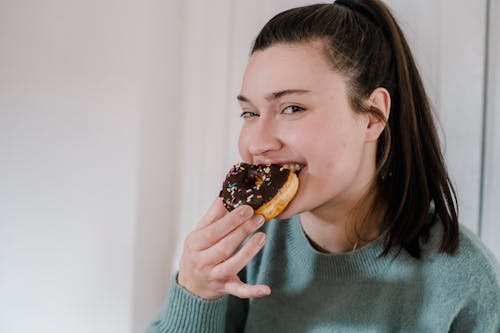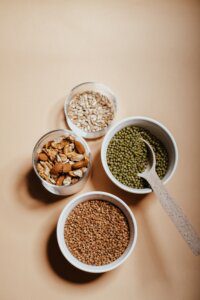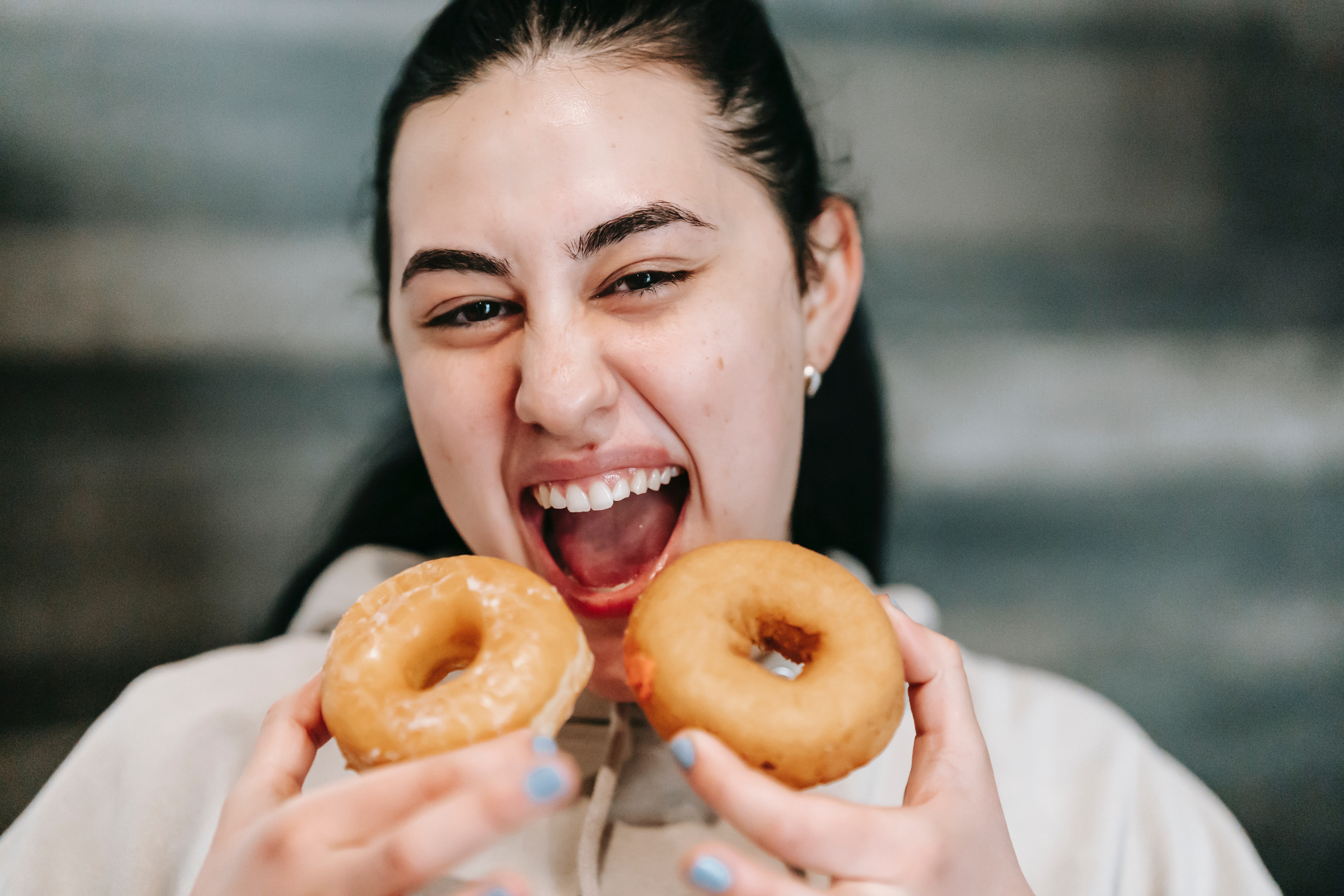Do you often get strong sugar cravings at night? It’s not just you. many people experience this difficulty to overcome overnight sugar cravings. But you may conquer them by identifying the causes of these urges and using sensible methods. In this post, we’ll look into the reasons why people crave sweets at night and offer helpful advice on how to stop them. Let’s start now!

According to new research, the circadian cycle makes people hungrier and more likely to crave sugary, starchy, and salty foods at night.
Since the human body absorbs nutrients differently based on the time of day, eating higher-calorie foods at night can be harmful if losing weight is a goal.
What causes a sugar craving, do you know?
When something is sugary, you may experience a strong desire for it. People commonly mention having a strong desire for sweets. Sugar activates the brain’s reward system and releases feel-good chemicals, which leads to sugar cravings.
This satisfying reaction fuels the want for more sweets, starting a vicious cycle. These desires are influenced by physiology, psychology, and environmental factors.
Understanding the underlying causes and putting measures like a balanced diet, stress management, and looking for healthier alternatives into practice is necessary to manage sugar cravings.
Even while treating yourself once in a while is acceptable, eating sugary foods frequently can be harmful to your health. Creating a balanced, attentive response to sugar cravings can promote general well-being and a healthier relationship with food.
Like what you read? Read more here: Fuel for Success: 7 Strategies for Balancing Student Life, Diet, and Optimal Performance
Tips for controlling your cravings
Managing nighttime sugar cravings at night can be difficult, it is possible to take back control of your eating patterns and lessen the severity of those desires with the right tactics. Following are some useful advice:
1. Change Your Eating Routine

Creating a balanced and nutritious eating schedule during the day will help minimise nighttime sugar cravings that are very strong.
Focus on eating meals that are high in protein, fibre, and healthy fats because these nutrients help you feel fuller for longer and help to keep your blood sugar levels stable.
Avoid missing meals and severely reducing calories as these can trigger cravings later on.
2. Identify Trigger items

Keep track of the particular items that tend to make you need sugar at night. It can vary from person to person, but typical offenders include sugary and highly processed snacks.
When you know what foods make you crave them, you may take proactive measures to avoid storing them in your cupboard or look for healthy substitutes that will satisfy your cravings.
3. Get Enough Sleep

Sleeping well is a top priority for controlling urges. Each night, try to get 7-9 hours of unbroken sleep. You are less likely to experience strong sugar cravings when you are well-rested because the hormones that control your appetite are in better balance.
To encourage better sleep, create a sleep-friendly environment, establish a calm bedtime ritual, and reduce your evening coffee use.
4. Control Stress

Long-term stress might lead to increased sugar cravings. Find healthy coping mechanisms for stress, such as frequent exercise, deep breathing exercises, or meditation, or engage in activities that you enjoy.
Your ability to stop emotional eating and lessen the desire for sweets depends on how much stress you are under.
Keep in mind that controlling sugar cravings requires time and patience. Being gentle to yourself and emphasising progress over perfection is essential.
5. Stay hydrated

Drink plenty of water since sometimes hunger or cravings might be confused with thirst. To stay hydrated throughout the day and lower your risk of cravings, drink water frequently.
6. Plan and get ready

Have nutritious foods on hand for satisfying cravings. Stock up on fruits, nuts, or Greek yoghurt for a better-for-you substitute for sugary munchies.
7. Practice mindful eating

Eat mindfully by paying attention to your body’s signals of hunger and fullness. Eat carefully and slowly to fully enjoy the flavors and textures of your meal.
8. Distract yourself

When a craving hits, try doing anything that will divert your attention from food. As a diversion, take a walk, read a book, or indulge in a hobby to pass the time.
9. Exercise portion control

If you have a desire for a certain food, give yourself permission to enjoy it in moderation. Have a little amount to satisfy your hunger without going over rather than limiting yourself entirely.
10. Choose healthier substitutes

Look for healthier substitutes for your favourite indulgent foods. Try eating a piece of dark chocolate or a fruit-based dessert instead of going for sugary treats if you’re seeking something sweet.
11. Keep a food journal
Keeping a food journal will help you become more conscious of your eating habits and spot any cravings that show up repeatedly. You can track your development and make any corrections with its assistance.
12. Self-care is a good idea
Looking after your general well-being might help cut down on cravings. Make sure you’re getting enough sleep, exercising frequently, and efficiently handling stress.
13. Keep calm
Keep in mind that managing urges is a journey, and it’s natural to make mistakes from time to time. Instead of aiming for perfection, be nice to yourself and concentrate on implementing long-lasting changes.
14. Skip the Soda
Stay clear of sugary drinks like soda, which can quickly raise blood sugar levels and trigger cravings. Instead, choose water, herbal tea, or infused water.
15. Shut off the TV
Unwanted sugar cravings might result from mindless eating while watching TV. Make your environment distraction-free and achieve things that aren’t related to food.
16. Fill up on Fiber
Add whole grains, fruits, vegetables, legumes, and other fibre-rich foods in your meals and snacks. Sugar cravings are reduced by fibre’s capacity to balance blood sugar levels and encourage satiety.
17. Focus on Low-Glycemic Foods

Pick foods with a low glycemic index, like whole grains, nuts, seeds, and non-starchy vegetables. These foods digest more slowly, reducing quick blood sugar rises and resulting cravings.
18. Ask for help
If you’re having trouble controlling your desires, think about asking a qualified dietician or a member of the medical community for assistance. They can offer you specific support and direction as you deal with your desires.
Tip: Implementing these suggestions and gradually altering your lifestyle can help you better manage your cravings and advance your general health and well-being.
Why do we crave sugar at night?
There can be several underlying causes for a nighttime sugar need.
First, it might be connected to our body’s circadian clock. Our energy levels normally drop in the evening, so to fight exhaustion, we could turn to fast energy boosts from sugary foods.
Secondly, emotional issues like stress, boredom, or loneliness might cause evening cravings. Sugar gives short-term relief and pleasure, which makes people crave sweets as a sort of emotional support.
Related: Loneliness and Mental Health: Effective Coping Strategies
Additionally, some routines and habits, like nibbling in the evening while unwinding or watching TV, can strengthen the link between sugar and slumber. Insufficient sleep or an unbalanced diet during the day might also contribute to cravings later in the day.
Creating a balanced eating routine, controlling stress, adopting good bedtime routines, and ensuring appropriate sleep, all of these factors must be addressed to reduce at-night sugar cravings.
Related: Diet and Nutrition: 10 Incredible Ways to enhance your eating habits.
Effects of Late Night Eating on Health
Our health can suffer from several issues related to sugar cravings at night. Our sleep habits can be disturbed if we eat sugary foods right before bed.
High sugar intake can cause a blood sugar rise followed by a sharp decline, which can affect the length and quality of sleep. Our immune system, mood, and thinking abilities may all be affected by lack of sleep, which may also hurt our overall health.
Also, eating late at night often ends in overeating, which can cause weight gain and raise the risk of getting chronic diseases including obesity, diabetes, and heart disease.
Related: Chronic Kidney Disease: 5 Incredibly Effective Ways to Deal With It
Related: Type 2 Diabetes: How to understand and treat symptoms.
Furthermore, eating sugary meals before going to bed increases the chance of dental problems because the sugar feeds the bad bacteria in the mouth that cause cavities and tooth decay.
Risk Factors Associated with Sugar Cravings at Night
There is a higher chance of nighttime sugar cravings due to several situations. Regularly eating foods high in sugar throughout the day is one common cause.
When we eat a diet rich in added sugars, we may experience increased sugar cravings at night as a result of a cycle of sugar dependence and seeking.
In particular in the evening when we may turn to food for comfort and emotional support, mental factors like stress, anxiety, and boredom can also contribute to the onset of sugar cravings at night.
We may also feel unsatisfied and more prone to experience cravings later in the day if we don’t consume enough nutrients during the day, particularly protein and fibre.
Also, a lack of sleep or poor quality sleep can interfere with the hormones that control appetite, increasing hunger and cravings—including those for sweet foods—and disturb the body’s ability to regulate appetite.
It is possible to control nocturnal sugar cravings and advance general health and well-being by being aware of these risk factors and putting tactics to address them into practice.
Seeking Professional help
The main causes of your sugar cravings may be effectively addressed with the help of a specialist if you discover that they are difficult to control and persistent at night. When looking for medical help, keep the following factors in mind:
1. therapy kinds
Several different therapy kinds can assist you in conquering your sugar cravings at night to develop healthier eating habits.
- Talking with an experienced nutritionist or dietitian may provide personalised advice on creating a well-balanced meal plan to treat nutritional deficiencies.
- Another successful strategy is cognitive behavioural treatment (CBT), which focuses on understanding and changing the thoughts and behaviours that fuel cravings.
Support groups or counselling sessions can also give a secure environment for people to share experiences and get advice from others who are facing similar challenges.
2. Advantages of Specialist Care
Consulting a specialist can help you manage your urges in several ways. A qualified healthcare practitioner may offer an unbiased viewpoint, evidence-based recommendations, and treatment programmes that are customised to your unique need.
They can provide you with the means to properly address any underlying emotional or psychological issues that may be causing your desires.
Additionally, professional care provides continuing support and responsibility, which can significantly increase your odds of success in reducing sugar cravings and forming better behaviours.
Never forget that asking for expert assistance is not a sign of weakness but rather a proactive move towards enhancing your general well-being.
It demonstrates your dedication to implementing healthy lifestyle changes and seeking advice from professionals with expertise in nutrition and mental health.
Working with experts can help you overcome your sugar cravings at night and have long-term success in keeping a healthy diet by providing you with insightful knowledge, useful tools, and supportive care.
Nutrition to Beat the Sugar Cravings at Night
Managing your need for sugary sweets is a key component of overcoming sugar cravings at night, and nutrition is a key component. You can help control cravings and advance general well-being by including specified foods in your diet and choosing nutrient-dense substitutes. Think about the following methods:
Foods That Suppress Cravings
Including specific foods in your meals can reduce sugar cravings at night. high in fibre foods like Fruits, vegetables, and whole grains give you a feeling of fullness and help to keep your blood sugar levels stable, this reduces your chances of cravings.
to help you feel fuller you can include in your diet protein-rich foods such as lean meats, lentils, and Greek yoghurt for longer and reduce your cravings for sweet snacks. Healthy fats from foods like avocados, almonds, and seeds can also help you feel satisfied and satiated.
Nutrient-Dense Alternatives
Choosing nutrient-dense alternatives can be a smart move when a sweet tooth strikes. Consider treating yourself to naturally sweet foods like fresh fruits rather than opting for sugary treats.
Fruits like berries, apples, and citrus fruits are not only delicious but also a good source of fibre, vitamins, and minerals. Furthermore, using naturally sweet spices like cinnamon or vanilla can flavour dishes without the need for extra sugar.
Finally, a more healthy option is to delight in homemade sweets made with healthy ingredients like dates, unsweetened cocoa powder, or natural sweeteners like honey or maple syrup.
Find tasty ways to include these healthy options in your everyday meals and snacks by experimenting with various flavours. You may improve your connection with food and conquer those constant sugar cravings with patience and practice.
Related: The Dark Side of Food Processing: 5 Stealthy Health Risks Exposed
What should I eat if I crave it at night?
Choose healthier options to satisfy your sweet desire when you have nighttime cravings. A small piece of dark chocolate, almonds, seeds, fresh fruit, Greek yoghurt, or herbal tea are all suitable options. Without affecting your efforts to consume a balanced diet, these choices offer natural sweetness, nutrition, and satisfaction. Keep in mind to make decisions that are supportive of your general well-being.
What deficiency cause sugar cravings?
Sugar cravings may be caused by deficiencies in vital nutrients including protein, healthy fats, magnesium, chromium, and zinc. To address these nutritional deficiencies and lessen cravings, make sure your diet is balanced and includes a variety of nutrient-rich foods.
Why do diabetics crave sugar at night?
Sugar cravings in diabetics can happen at night for a variety of reasons. some diabetes treatments may affect blood sugar levels, leading to the need for sweet meals. Additionally, a diabetic may experience cravings for rapid sources of energy like sugary snacks if their blood sugar levels go too low throughout the night.
they have night cravings for sugar because of hormonal imbalances, stress, and insufficient sleep. These desires can be lessened by controlling blood sugar levels with the use of appropriate medication, a balanced diet, consistent exercise, and stress-reduction measures. To control their condition and deal with sugar cravings, diabetics must work together with their healthcare team to create a specialised strategy.
What are the symptoms of sugar cravings?
The signs of sugar cravings include strong cravings, increased appetite, mood swings, erratic energy levels, difficulties concentrating, bodily symptoms, and a strong attraction for sweet meals.
Does craving sugar mean diabetes?
It’s not always a sign of diabetes to have a sugar craving. Many things, like hormone imbalances, stress, emotional triggers, or a diet heavy in processed foods, might cause it. For a precise diagnosis, if you have diabetes issues, it is best to speak with a healthcare provider.
Does stress cause sugar cravings?
Yes, stress can make you crave sugar. The hormone cortisol, which can boost hunger and specifically cravings for sugary and high-carbohydrate foods, is released by the body when we are under stress. These meals make people want to eat them during stressful situations because they temporarily increase their mood and vitality. Finding healthy methods of stress management is important rather than turning to comfort foods high in sugar.
Do hormones cause sugar cravings?
Yes, hormones can lead to a hunger for sugar. Hormonal changes in the body can affect hunger and food cravings, especially a desire for sweet foods, during times of menstruation, pregnancy, or menopause. Neurotransmitters in the brain can be affected by hormones like estrogen and progesterone, increasing the desire for sweets. To support general health, it’s important to be aware of these urges and make careful choices to balance your diet with nourishing foods.
Why do I crave sugar after a meal?
After-meal sugar cravings can be impacted by a number of things. A possible reason is that eating carbs, particularly refined ones, can quickly raise blood sugar levels before they fall. Sugar cravings may result from this reduction in blood sugar as a means of swiftly restoring normal levels. Also, some foods, such as drinks or desserts with a lot of sugar, might trigger the reward center of the brain, increasing the desire for more sweets. Sugar cravings after meals can also be caused by other things including emotional eating, habit, or an unbalanced diet.
Conclusion
There are many possible root causes for sugar cravings at night. These cravings can be increased by conditions including diabetes and hormone imbalances, lack of sleep, stress, and some medications. For your general well-being and health, it is vital to address and control these desires.
It is easy to control and lessen evening sugar cravings by changing one’s diet, identifying trigger foods, getting enough sleep, regulating stress levels, getting professional treatment if necessary, and maintaining correct nutrition. Everyone experiences sugar cravings differently, so it’s vital to keep in mind that discovering the methods that are most effective for you will be key.
People can take back control of their health and conquer nighttime sugar cravings by adopting a balanced strategy and taking early steps to reduce their cravings.

